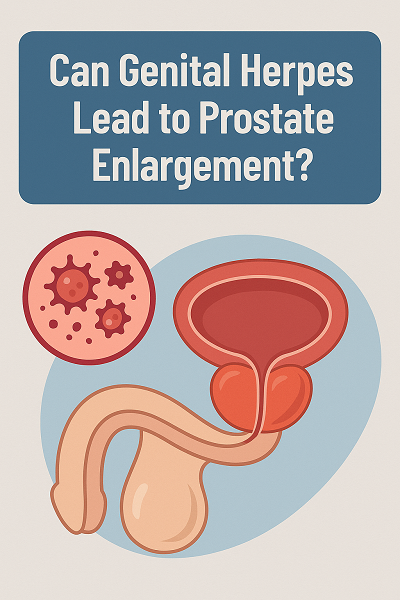Can Genital Herpes Lead to Prostate Enlargement? What Every Man Should Know
Genital herpes is a chronic, recurrent, and difficult-to-cure sexually transmitted disease caused by herpes simplex virus (HSV) infection of the urogenital and perianal mucosa. Over the past 30 years, the incidence of this disease has continued to rise, and it has become the leading cause of genital ulcers in many countries and regions.

How Can Genital Herpes Affect Your Prostate?
Genital herpes is a type of viral infection. If not treated promptly and effectively, the herpes virus can enter the urethra from the glans penis, ascend through the urethra into the posterior urethra and prostate, thereby causing prostatitis. Prostate enlargement, as the name suggests, refers to an abnormal increase in the volume of the prostate. There are numerous causes of prostate enlargement, among which prostatitis is a significant factor.
When the prostate is attacked by inflammation, its tissues may exhibit reactions such as congestion and edema, leading to a temporary increase in prostate volume. This enlargement usually subsides gradually as the inflammation resolves. However, if prostatitis is not treated promptly and effectively, long-term inflammatory stimulation may cause fibrosis or calcification of the prostate tissue, resulting in persistent prostate enlargement.
In summary, genital herpes can lead to prostatitis, which in turn may cause prostate enlargement.
What Are the Symptoms of Genital Herpes?
1. Before the rash appears, there is a local burning sensation, tingling, or abnormal feeling. Small clustered blisters appear around the external genitalia or anus, which quickly rupture to form erosions or shallow ulcers.
2. Generally, the time from exposure to onset is about 2-10 days, which is the incubation period. The affected area first experiences a burning sensation, followed quickly by the appearance of 3-10 clustered red papules on an erythematous base, accompanied by itching. The papules soon turn into small blisters, which become pustules in 3-5 days. After rupturing, they form large areas of erosion and ulcers, causing conscious pain, and finally scab over to heal. The entire course can last about 20 days. Most male patients experience bilateral inguinal lymphadenopathy.
3. In later stages, when the inflammation spreads to the urethra and bladder, symptoms such as dysuria, painful urination, frequent urination may occur. In severe cases, urinary retention may develop.
4. Other accompanying symptoms may also appear simultaneously, such as fever, general malaise, headache, neck stiffness, meningitis, and sacral nervous system dysfunction.
5. Approximately 10% of affected individuals develop pharyngitis. About 10% of male patients with genital herpes may also develop lesions outside the genital area—commonly on the buttocks or fingers—usually as a result of self-inoculation. These typically appear in the second week following genital herpes outbreak and are mostly caused by autoinoculation of the virus from the infected genital area.
6. Among patients with genital herpes, homosexual males may develop type II herpes virus anorectal infection, which ranks second only to gonococcal anorectal infections in male patients. Clinical manifestations include severe anorectal pain, constipation, purulent discharge, and tenesmus. Herpetic lesions and ulcers may be present in the anal area.
Hidden Dangers of Genital Herpes
If not treated promptly, the herpes virus will continue to multiply extensively in the patient's body over time. In addition to prostate enlargement, it can also lead to various complications such as disseminated herpes, herpes meningitis, and spinal radiculopathy. Moreover, recurrent outbreaks can cause extreme distress to patients.
From a psychological perspective, the occurrence of genital herpes imposes a significant burden on patients, primarily manifested as fear of cancer, fear of transmission, reluctance to interact with the opposite sex, and even sexual dysfunction, which can disrupt family harmony.
Genital herpes can also pose infertility risks for males. According to expert research, the genital herpes pathogen can reduce sperm quality, leading to male immunological infertility.
How to Treat Genital Herpes and Related Prostate Issues
1. Medication Therapy
Genital herpes is primarily caused by a viral infection. To treat prostate enlargement induced by genital herpes, it is essential to eliminate the herpes virus. Drugs such as acyclovir, valacyclovir, and famciclovir can be used to treat genital herpes, alleviate symptoms, shorten the disease course, and partially clear the virus.
2. Topical Treatment
Keep the affected area clean and dry. The skin lesions can be treated with topical applications such as acyclovir cream, penciclovir cream, and ftibamzone cream. If secondary bacterial infection occurs, antibiotics should be added.
3. Traditional Chinese Medicine (TCM) Therapy
Patients with recurrent herpes often experience fatigue and psychological anxiety. Therefore, while actively administering antiviral treatment, some TCM remedies that strengthen the spleen, resolve dampness, clear heat and toxins, nourish the liver and kidneys, or replenish yin and clear heat—such as Shen Ling Bai Zhu San (Ginseng, Poria, and Atractylodes Macrocephala Powder) and Zhi Bai Di Huang Wan (Anemarrhena, Phellodendron, and Rehmannia Pill)—may be effective for some patients.
For those with prostatitis or recurring inflammation, herbal formulas like the Diuretic and Anti-inflammatory Pill—developed based on traditional Chinese medicine—may offer a natural alternative to relieve symptoms and reduce prostate swelling.
4. Psychological Therapy
Due to the highly recurrent nature of this disease, frequent outbreaks often cause distress and anxiety in patients. It is essential to provide patients with patient and meticulous psychological therapy, encouraging them to strengthen their confidence in overcoming the disease and actively cooperate with treatment.
How to Prevent the Spread of Genital Herpes
Preventing the transmission of genital herpes should focus on three aspects: eliminating sources of infection, cutting off transmission routes, and enhancing the immunity of susceptible populations. The method to improve protective immunity in susceptible populations is through vaccination. According to research data, the development of a highly effective vaccine for preventing HSV infection may be achieved in the near future.
Ultimately, managing genital herpes and its potential complications—like prostate enlargement—requires a comprehensive approach. This includes proper antiviral treatment, regular medical checkups, healthy lifestyle choices, and strong psychological support. Early intervention can make a significant difference in long-term outcomes.



